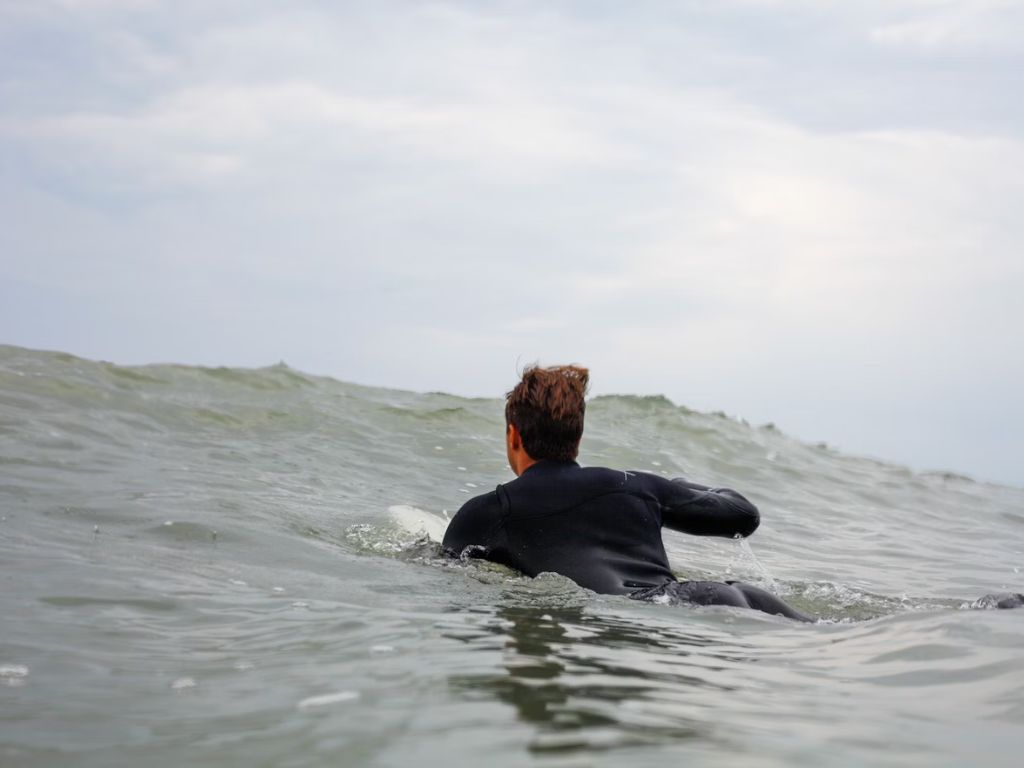Surfing is a heart-pounding activity, but it is not without its physical and mental challenges you must overcome.
One such challenge is vertigo, a spinning sensation that disrupts your balance. If you haven’t had it yet, it’s a doozy. Quite literally.
Surfing, swimming, and other such activities can often make you dizzy and trigger vertigo. Surfers should warm up properly, stay hydrated, and use proper gear to avoid dizziness. Because it could increase due to rapid head movements and water motion, causing sensory overload to your submerged head.
Trust me, it’s easy to shrug this off as a beginner-only problem. After all, some of you have been doing this for a long time. But surfears.com put it best: vestibular errors are vestibular errors.
You may have gotten accustomed to the dizziness and sensations caused by water in your ear. But it still affects your brain and makes surfing harder.
Think about it this way: if you’re enjoying your surf sessions now, how better would it be when you’re actually at your 100%?
Disclaimer: Before we begin, I wanted to clarify that vertigo is a multifaceted condition with various underlying causes, and its symptoms can differ from person to person.
What exactly is vertigo?
Vertigo is a specific type of dizziness that creates a false sense of movement.
Symptoms of vertigo include a spinning sensation or feeling that the world around you is in motion. This disorienting sensation leads to dizziness and imbalance. Nausea and vomiting are also common symptoms associated with a vertigo episode.
Generally, it’s not a standalone condition but rather a symptom of an underlying issue. There are two main types of vertigo: peripheral vertigo and central vertigo.
Peripheral vertigo arises from problems in the inner ear, while central vertigo stems from brain or major nervous system issues.
Okay, enough science. Let’s talk surfing. For surfers, vertigo symptoms are particularly challenging because they affect your ability to navigate through waves, execute turns, and maintain stability.

How can surfing make you dizzy?
Surfing can make you dizzy or trigger a vertigo episode due to rapid head movements and the motion of the water. Both can overload your visual, auditory, and physical stimuli. They may even exacerbate an underlying medical problem like an ear infection or head trauma.
Let me explain in detail.
Rapid and repetitive head movements: Surfers frequently turn their heads to assess the wave’s direction or for a dozen other reasons. These quick movements can disturb the delicate balance mechanisms in the inner ear.
The motion of the water: The constant movement of the waves creates a dynamic environment that challenges your equilibrium. The up-and-down motion and ever-changing water currents can affect the body’s sense of balance.
Why am I getting vertigo while surfing?
During surfing, sudden vertigo (or dizziness) episodes are generally caused by inner ear issues, such as benign paroxysmal positional vertigo (BPPV) or Meniere’s disease. Other factors like anxiety, stress, dehydration, and fatigue can exacerbate the risk of experiencing vertigo.
What to do if you get vertigo while surfing?
Steps to take immediately.
Let’s move to the immediate steps you gotta take if you go through a vertigo episode while surfing.
1. Stay Calm.
Panicking or becoming anxious can worsen your symptoms and compromise your safety in the water. Take deep breaths and try to relax.
2. Stop Surfing.
If you feel dizzy or experience a spinning sensation, it’s crucial to immediately stop surfing. Continuing to ride waves or pushing through the discomfort may increase the risk of injury to yourself or others.
3. Find a Stable Position.
Once out of the water, find a stable position to sit or lie comfortably. This will help alleviate the dizziness and regain your balance. Avoid sudden head movements that can exacerbate your symptoms.
4. Ask for Help.
Don’t try to power through the issue. If symptoms feel worse or disruptive in any way, seek help and medical attention.

Necessary steps once you’re out of water.
Now that you’re safely out of the water, here’s what you need to do:
1. Drink water.
Dehydration can worsen vertigo symptoms, so drink plenty of water.
2. Rest and Relax.
Allow yourself time to rest and recover. Vertigo can be physically and mentally draining, so take a break from strenuous activities.
3. Medication.
In some cases, medications may be prescribed to manage vertigo symptoms. Antihistamines or anti-nausea medications can help alleviate dizziness and reduce the discomfort associated with vertigo.
However, medication use should be under a healthcare professional’s guidance.
4. Lifestyle Modifications.
Avoiding triggers such as excessive caffeine, alcohol, and tobacco can help reduce the severity and frequency of vertigo episodes. Also, managing stress levels through meditation or yoga can improve overall well-being.
5. Gradual Return to Surfing.
Once your vertigo symptoms are under control and with the guidance of your healthcare professional, you can gradually return to surfing. Start with shorter sessions and focus on maintaining your balance and stability.
6. Surfing with a Buddy.
Consider surfing with a buddy who is aware of your vertigo condition. They can provide assistance and support if you experience vertigo while in the water.
How to avoid vertigo while surfing?
For surfers who struggle with vertigo, managing their symptoms and reducing the risk of episodes is of utmost importance.
1. Proper Warm-Up Exercises
Incorporate exercises that improve balance, coordination, and core strength. These activities can help activate the muscles, increase blood flow, and improve proprioception, reducing the likelihood of getting dizzy from vertigo.
2. Hydration and Nutrition
Dehydration can exacerbate dizziness, so drink plenty of water before, during, and after your surfing sessions. Additionally, fuel your body with a balanced diet that includes nutrient-rich foods to support your energy levels and maintain stable blood sugar levels.
3. Appropriate Gear
Ensure your wetsuit or rash guard fits properly and doesn’t restrict movement. Consider wearing a surf hat or sunscreen to protect your head and face from excessive sun exposure, which can potentially worsen vertigo symptoms.

4. Find Your Balance
Finding a balance between pushing your limits and avoiding triggers that may worsen vertigo symptoms is crucial. Recognize your body’s signals and limitations, and don’t hesitate to take breaks when needed.
5. Modify Surfing Techniques
Consider modifying your surfing techniques to reduce the risk of triggering vertigo.
Avoid excessive rapid head movements, disrupting your balance and triggering dizziness. Practice smooth transitions between maneuvers and maintain a relaxed and fluid body posture while riding the waves.
Concentrate on maintaining a steady gaze on the horizon or a fixed point to help stabilize your visual perception.
6. Seek Professional Guidance
If you’re struggling with vertigo while surfing, it’s advisable to seek professional guidance from healthcare providers or specialists who specialize in vestibular disorders.
How to seek professional help for vertigo?
When managing vertigo and enhancing your surfing experience, seeking professional help can make a significant difference.
Consult healthcare professionals who specialize in conditions related to the inner ear, such as otolaryngologists (ENT specialists) or vestibular therapists, for a proper diagnosis and guidance.
An ENT specialist can conduct a thorough evaluation to determine the underlying cause of your vertigo symptoms.
Additionally, vestibular therapists are healthcare professionals who specialize in treating balance disorders and vertigo. Through various exercises and techniques, they can help improve your balance, reduce symptoms of vertigo, and enhance your overall vestibular function.
Expert QnA
Q. Can water in the ears cause vertigo?
Generally, water in the ears can potentially cause vertigo. Water can disrupt the normal functioning of the balance organs, leading to feelings of dizziness and imbalance. This condition is known as “swimmer’s ear” or otolithic vertigo.
Q. How long do vertigo episodes typically last?
The duration of vertigo episodes can vary, ranging from a few seconds to minutes or even hours. The frequency of outbreaks can also vary from person to person.
Q. Are there ways to avoid vertigo while surfing?
While it’s impossible to prevent vertigo episodes completely, you can take preventive measures such as proper warm-up exercises, good hydration and nutrition, and wearing appropriate gear to minimize the risk.
Q. Can Surfer’s Ear cause vertigo?
Surfer’s ear, medically known as exostosis, does not directly cause vertigo. However, it can increase the risk of ear infections and ear canal inflammation. Subsequently, these ear infections can lead to dizziness, balance problems, and other vertigo-like symptoms.





